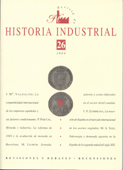International Competitiveness of the Spanish firms and its determining factors. Evidences from business history
DOI:
https://doi.org/10.1344/rhi.v1i26.19522Keywords:
International Competitiveness, Entreprenenship, Human CapitalAbstract
This article attempts to analyse the international competitiveness of the Spanish firms in the 19th and 20th centuries and their determining factors from the evidence provided by the research carried out within the business and industrial history in Spain in the last twenty years. Four factors are evaluated: the role of entrepreneurship, technology and human capital; the relative size of the Spanish firms and its domestic market; the matrix of firms' resources and capabilities and their strategies of production and commercialisation; and, finally, the competitive rivalry in the domes-tic market and other institutional factors. The limited presence of Spanish firms in the international market until the 1990s is explained on account of their deficient base of resources and capabilities, a business strategy focused on price (and low quality) competition, and an institutional framework that encouraged unproductive entrepreneurial functions instead of productive ones, like those aimed to achieve efficiency, innovation and competitiveness.Downloads
Downloads
Published
How to Cite
Issue
Section
License
The author assigns all rights to the publisher. Creative Commons
The author who publishes in this journal agrees to the following terms:
- The author assigns all intellectual property rights exclusively to the publisher for the entire duration of the applicable intellectual property rights.
- The publisher will distribute the texts under the Creative Commons Attribution License, which allows others to share the work, provided that they acknowledge the authorship, its initial publication in this journal, and the conditions of the license.





